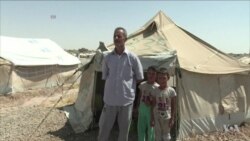As Iraqi forces continue to push back Islamic State militants from their strongholds, many civilians who fled the violence are seeking to return home.
Close to 5 million Iraqis fled the 2014 advance by IS and the ensuing violence that engulfed parts of the country. Since Iraqi and coalition forces began to retake territory from the militants, the United Nations estimates that around 1.7 million people have returned home.
Over 3 million, however, remain displaced with some housed in refugee camps, and others living with family or in private accommodations in other parts of Iraq.
A recent study by the U.N.’s International Organization for Migration looked at the reasons so many feel they cannot return home.
“The main obstacle obviously is security," says the IOM’s Hala Jaber, adding that if the refugees fear the people in charge of the places they hope to return to, they will not go there.
In some places, 85 percent of buildings and infrastructure were destroyed during the fighting.
“It sometimes delays people from returning, until they can fix their homes. Livelihood options are another major issue because if they don’t have employment and they don’t have a means of generating income, then that does not allow them to go home because they need to feed their families,” Jaber says.
Reliving horrors
For the ethnic Yazidi people, going home means reliving the horrors visited upon them by Islamic State. Thousands were murdered, and women and girls forced to become sex slaves – actions recognized as genocide by the U.N.
A recent conference organized by the AMAR Foundation, a London-based charity, sought to find solutions to help Yazidi refugees return home. Founder Emma Nicholson said many of the camps are not fit for this purpose.
“Refugee camps are no longer a place of refuge. They are places of child trafficking, of forced marriage, of murders, of lack of safety.”
Also attending the conference was Diar Fakhri Yousfi, the grandson of the prince of the Yazidis, the group’s spiritual leader. He told VOA his people’s needs are immense.
“The community doesn’t have faith anymore in humanity. We lost that faith. And so we need a safe place over there. But at this time it’s really difficult to tell them to go back.”
Aid groups say the Yazidis desperately need psychological and spiritual support, to rebuild their lives, otherwise many may never return home.






